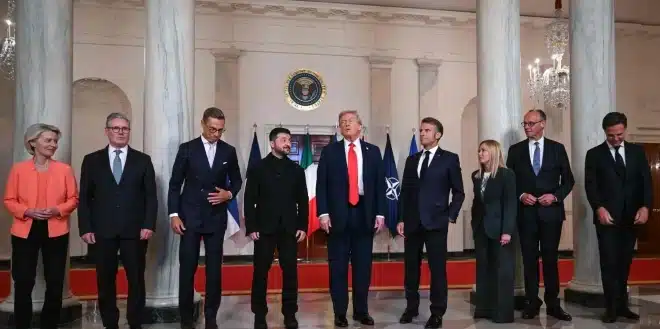Ukraine’s allies gathered on Tuesday to assess the progress of rapidly evolving diplomatic talks aimed at ending the war with Russia. The discussions follow mounting signs that Ukrainian President Volodymyr Zelensky and Russian President Vladimir Putin could meet face-to-face for the first time since the war began more than three years ago.
The possibility of a peace summit has raised cautious optimism among Kyiv’s partners, even as concerns linger over Moscow’s credibility and Ukraine’s future security arrangements.
Washington Meetings Spark Hopes of Breakthrough
Momentum for talks accelerated after Zelensky and a group of European leaders met with U.S. President Donald Trump in Washington on Monday. Trump revealed that he had spoken by phone with Putin and suggested preparations were underway for a direct meeting between the two wartime leaders.
The conflict, which has already claimed tens of thousands of lives, remains deadlocked despite Russia making minor territorial gains in recent months. Trump, who has been pressing for a negotiated settlement, described the atmosphere after the Washington talks as one of “hope for peace.”
Trump went further, stating that he intended to host a three-way summit involving himself, Zelensky, and Putin, though the venue and format remain undecided.
Europe’s Response and Security Concerns
French President Emmanuel Macron, who was in Washington for the talks, said France and Britain would co-chair a follow-up meeting with around 30 of Ukraine’s allies on Tuesday. This “coalition of the willing,” as described by Paris, will coordinate next steps and review decisions made in Washington.
Macron suggested Geneva could serve as a neutral venue for potential peace negotiations but emphasized that the decision rested with Ukraine, particularly regarding any concessions on disputed territory such as parts of the Donbas. He also issued a stark warning about Putin’s intentions, calling the Russian president “a predator, an ogre at our gates” and stressing that Moscow has repeatedly broken past commitments.
British Prime Minister Keir Starmer is also co-hosting the coalition talks, while German Chancellor Friedrich Merz confirmed that Putin had tentatively agreed to meet Zelensky within the next two weeks.
Zelensky’s Position and Moscow’s Signals
Zelensky publicly declared that he was ready to meet his “bitter foe” Putin, underscoring his willingness to explore direct diplomacy. The Kremlin, meanwhile, signaled openness to the idea, with a senior aide noting that Putin was prepared to consider talks “in principle.”
Still, trust remains fragile. A summit between Trump and Putin in Alaska the previous week produced no ceasefire, and Russian drone strikes on Ukraine have continued daily.
After that failed effort, Zelensky traveled urgently to Washington, where he met privately with Trump in the Oval Office. Unlike their tense February encounter—when Trump and Vice President JD Vance chastised him on live television—the latest meeting was described by Zelensky as their “best yet.”
Security Guarantees and Military Commitments
Another central focus of the talks has been security guarantees for Ukraine, a longstanding demand by Kyiv as it remains blocked from NATO membership. Trump claimed that Putin had accepted the concept of guarantees provided by European powers in coordination with the United States, though not NATO accession itself.
According to reporting by the Financial Times, Ukraine is expected to commit to a $100 billion purchase of U.S. weapons financed by European partners in exchange for long-term protection. Zelensky later confirmed negotiations on a similar package worth $90 billion, with a framework agreement expected within 10 days.
The European leaders’ participation highlighted both their support for Ukraine and unease over Trump’s shifting stance toward Putin. The U.S. president has previously urged Kyiv to abandon its claims to Crimea and to drop its NATO aspirations—two of Moscow’s key conditions for peace.
What This Could Mean
If realized, a Zelensky–Putin meeting would mark a pivotal moment in efforts to end the conflict, opening the door to the first direct talks since Russia’s invasion began nearly three and a half years ago. Yet questions remain: Can Moscow be trusted to honor commitments? Will Ukraine’s allies accept potential territorial compromises?
For now, the push for negotiations underscores growing international urgency to halt a war that has devastated Ukraine, destabilized Europe, and strained global security. Whether the latest flurry of diplomacy results in lasting peace—or another stalled initiative—will likely become clearer in the coming weeks.


